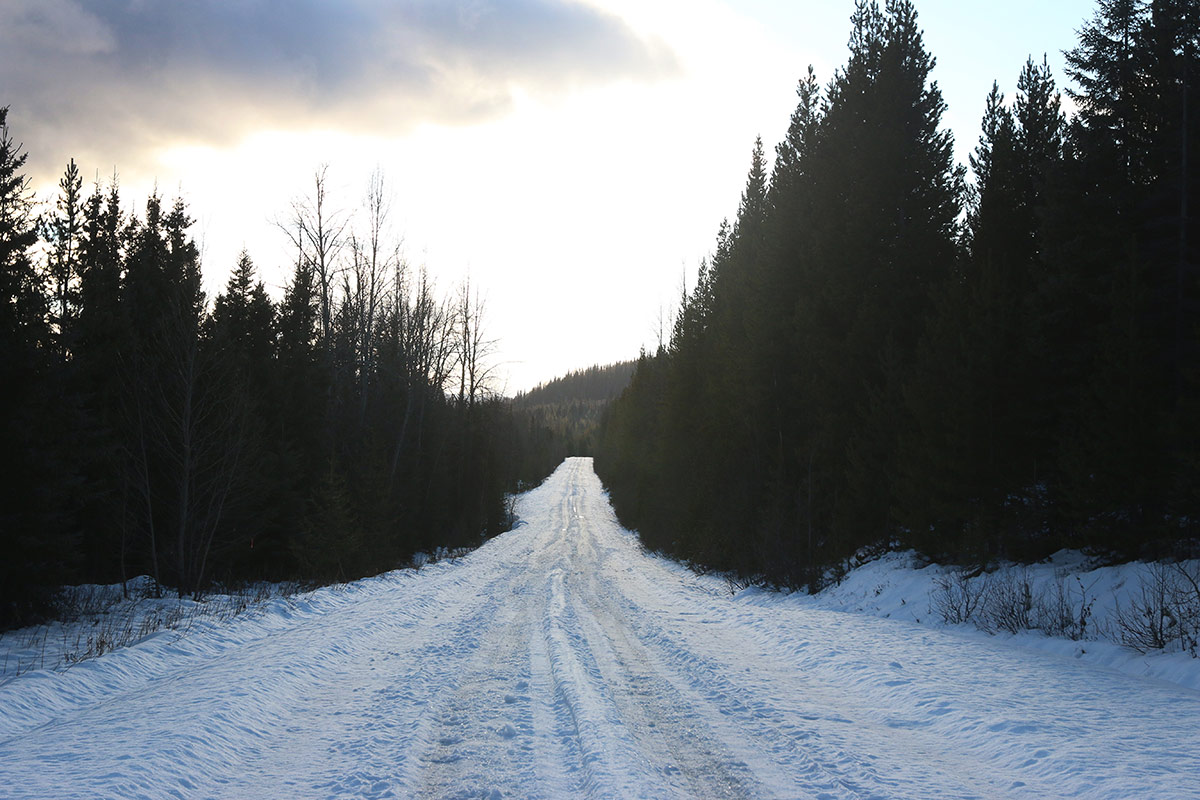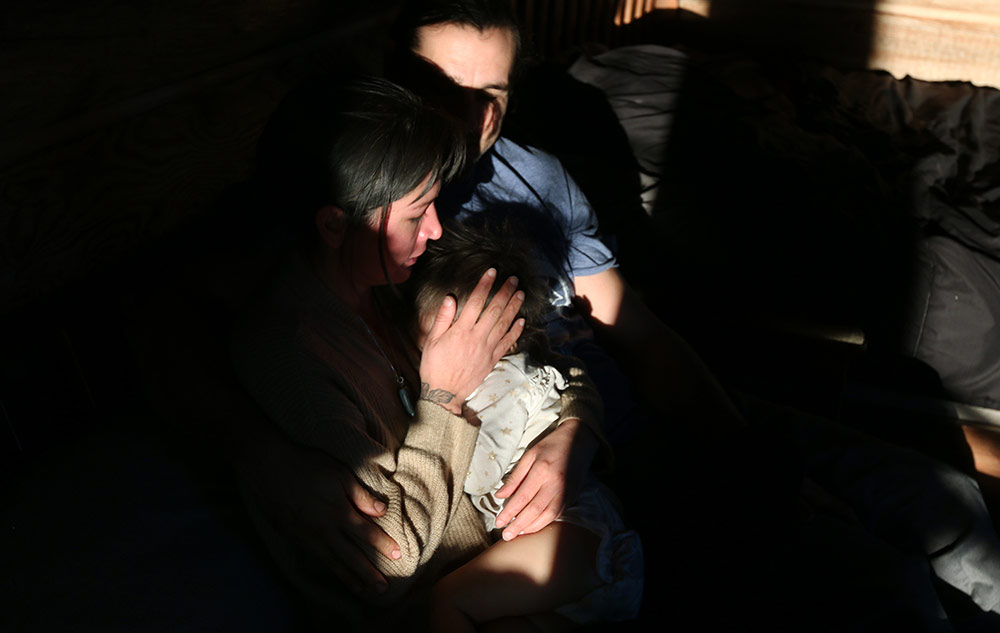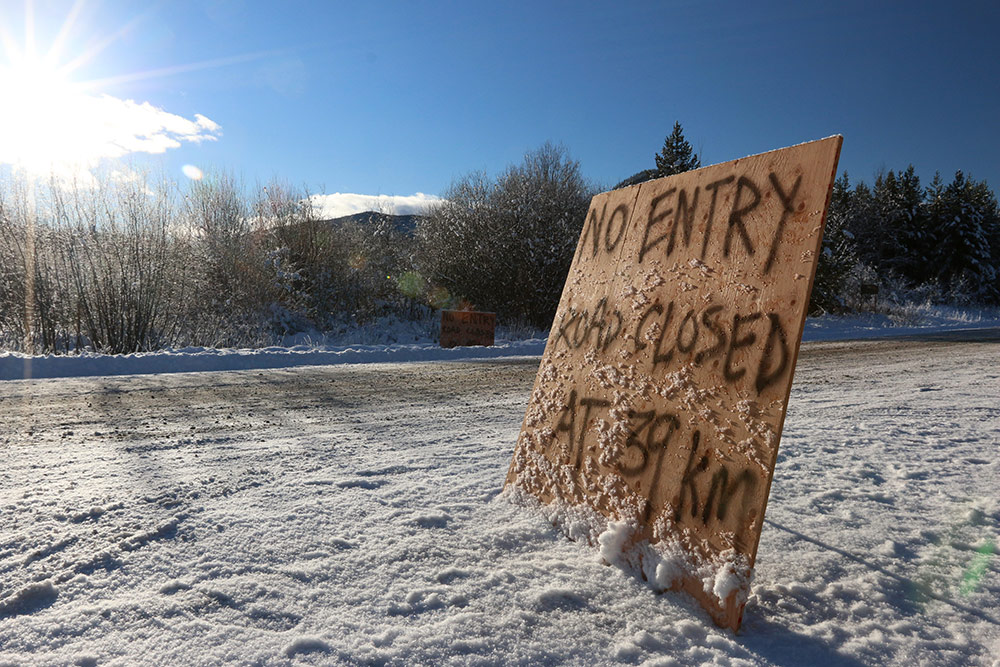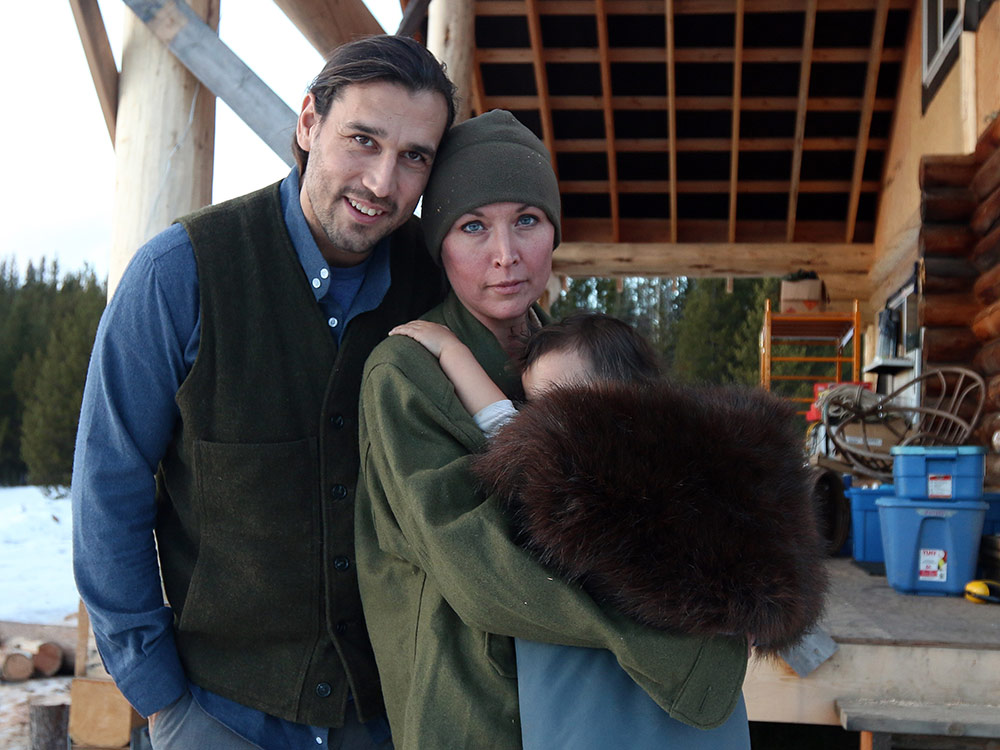At a cabin deep in Wet’suwet’en territory, the sound of children’s laughter filters through the floorboards from the loft above. A pajama-clad five-year-old peeks down the stairs to announce they are playing a game. “A make-believe game,” she clarifies before disappearing again.
Downstairs, Molly Wickham and Cody Merriman relax on their first day home, together, in more than a week. Wickham sips tea as Merriman reclines in a lounge chair. The baby naps on the bed nearby, and there’s a sense of calm in this home the couple built on Gidimt’en territory, the Wet’suwet’en clan to which Wickham belongs.
Despite his relaxed demeanour, Merriman stiffens as he begins to talk about the day, a week earlier, when he left his three children here with friends, expecting to be gone an hour or two. Instead, he was taken into police custody and didn’t return for days.
Both were arrested on Nov. 19 during a two-day police raid on Wet’suwet’en territory to clear access to the Coastal GasLink pipeline route.
But while his wife was occupying a pipeline worksite, Merriman says he had gone out of his way to avoid the conflict and be home with his children.
“The intention of going down there was to really just try to see Molly going by and just support her,” he says about Wickham, who’d been arrested on the territory hours before. “Everybody witnessed me actively not participating, to not be arrested, so that I could be with the kids.”
Wickham, who carries the Wet’suwet’en name Sleydo’, has been a prominent figure in the fight against Coastal GasLink, a 670-kilometre pipeline currently under construction through northern B.C.
Despite Wet’suwet’en hereditary leadership opposing the project, the B.C. Supreme Court issued an injunction barring anyone from blocking worksites or access roads into the pipeline route along the Morice West Forest Service Road.
The road, which has marked the epicentre of the Wet’suwet’en conflict over the past three years, leaves Highway 16 near Houston, B.C. and heads south. It is swept bare by graders and polished by the tires of industry traffic on their journey to worksites and accommodations, some more than 100 kilometres into the bush along the pipeline route.
At one juncture, the road splits in two. Traffic flows one direction, toward active worksites and work camps. In the other direction, it is rough and rutted where only a handful of tires tracks have left their mark in the early season snow.

The couple lives in a cabin nearby. Merriman was standing near the juncture on the unplowed fork when he was arrested on Nov. 19.
Members of the Gidimt’en Clan established a camp at the same intersection three years ago, in the wake of an interim injunction issued to Coastal GasLink. Gidimt’en Camp has been the site of several police actions — in January 2019, February 2020 and, most recently, two weeks ago.
In September, Gidimt’en members established Coyote Camp on a spur road of the Morice to block access to the site where the pipeline company plans to drill under the Morice River, a culturally significant waterway known to the Wet’suwet’en as Wedzin Kwa.
Two people had already been arrested at the camp when Wet’suwet’en Hereditary Chiefs enforced their eviction on Nov. 14 by closing the Morice road again. Supporters dropped trees and used Coastal GasLink machinery to dig trenches through the road, blocking vehicle access to pipeline worksites and worker accommodations.
That left some 500 pipeline workers stranded in their camps, according to Coastal GasLink. RCMP moved to open the road on Nov. 18, calling it a rescue mission. One officer said they would arrest anyone who got in the way of delivering supplies to the workers. Police arrested 15 people that day, including a documentary filmmaker who was later released.
The next morning, with supplies flowing into the work camps, Merriman was following social media posts from his cabin as Gidimt’en reported a convoy of RCMP vehicles heading back up the Morice toward Coyote Camp, where Wickham and 10 others, including two journalists, remained.
By noon, the camp was surrounded by dozens of militarized RCMP officers. The last dispatch from inside a cabin at the site came shortly after, when camp occupants tweeted that police were breaking down the door with an axe and a chainsaw.
“It was such a helpless feeling,” says Merriman, who is Haida and holds the name Wedlidi. He has deliberately maintained distance from the ongoing crisis on his wife’s territory.
He decided to make the 20-minute journey from their home to the junction at Gidimt’en Camp, where he knew RCMP vehicles would pass on their way to the Houston detachment following any arrests. There, he joined several others around a bonfire.
A video recorded by Merriman in the moments leading up to his arrest shows at least a dozen officers gathering on the Morice road before beginning to advance toward where he is standing.
One officer cites the injunction. “By you blockading this roadway and preventing Coastal GasLink from conducting their operations, you are in breach of that injunction. You are all under arrest,” the officer says, as RCMP dogs whine on their leashes.
“I’m not blocking the road,” Merriman repeatedly shouts as officers surround him, tension rising in his voice. “I want to leave. I’m not blocking the road.”
He says he was in shock, given his deliberate efforts to stay out of the conflict. “If there was panic, I think it was more that Molly is going to be fucking pissed,” he says.
He has no doubt the arresting officers knew him and his connection to the woman who had just been arrested 20 kilometres away.
“After they arrested me… they went on the radio and they’re like, ‘We just arrested Cody Wickham! We just arrested Cody Wickham!’” he says, describing how officers mistakenly used his wife’s surname.
What Merriman didn’t realize was that Wickham, who was among 11 people arrested at Coyote Camp, had already passed by the junction and was sitting in the back of a police cruiser that was stopped 16 kilometres down the road, where RCMP had set up a checkpoint and exclusion zone days earlier. She could hear the arrests unfolding on the radio.
“I heard them say on the radio, ‘There’s four people outside standing around the fire at 44. Do you want us to go arrest them?’” Wickham remembers. Moments later, an officer leaned into the cruiser and switched off the radio. She then saw two police vehicles turn and start heading back up the Morice road.
It wasn’t until later that she realized it was her husband, who was supposed to be at home with their children, that had been arrested.

“As soon as I walked into the detachment in Houston, the head of the RCMP detachment came and said, ‘Molly, who’s your husband’s lawyer?’ I was like, what are you talking about?” she remembers. “I’m like, none of these people are my husband. My husband wasn’t arrested.
“Then it clicked and I’m like, ‘Cody was arrested at 44,’ and I lost it. I just lost it.”
Despite knowing that her children were safe at home with friends, she worried for their emotional well-being knowing their father had headed out and never returned.
“Mentally and emotionally, I always know that they are with Cody, that they’re loved and taken care of, and that I never have to worry about them,” she says. “That just all changed in a second.”
Complicating the situation was the RCMP exclusion zone still in place on the Morice road. Sending family to retrieve the kids would mean involving police, something the couple was unwilling to do. “It was too much of a risk that the RCMP would use that as an excuse to target our children and take them,” Wickham says.
Police say 29 people were arrested over the two-day enforcement, a number that does not include the documentary filmmaker released the same day and two Elders who were removed from the territory by RCMP to receive medical attention before being released.
Nine others were released on the first day of arrests. Twenty remained in custody for several days until their bail hearings were held on Monday and Tuesday the following week. All 29 have been ordered to return to court in February.
In a news release issued the day of Merriman’s arrest, RCMP say the four people arrested at Gidimt’en Camp had reportedly been throwing rocks at industry vehicles, something that Merriman calls “absolutely, unequivocally untrue.”
He says police told him that report came from industry workers several kilometres from the site of the arrests.
The Tyee reached out to Coastal GasLink with questions about how many vehicles had been targeted by rocks, if there was damage to the vehicles and if a formal report was made to police about the incident. The company referred questions to the RCMP.
RCMP did not respond to questions emailed by The Tyee.
Police have been subject to criticism over the use of force during the arrests, in addition to the days-long detention of journalists Michael Toledano and Amber Bracken. Dozens of media advocacy groups and news outlets, including The Tyee, signed a letter from the Canadian Association of Journalists that demanded their release.
Human rights groups, First Nations and Indigenous organizations have also decried the use of militarized police to remove Wet’suwet’en from their land.
Last week in Parliament, Skeena-Bulkley Valley MP Taylor Bachrach said he’d heard “from dozens of Indigenous leaders who are horrified by what happened” and called on federal Public Safety Minister Marco Mendicino to review RCMP conduct during the arrests.
Despite the criticism, arrests continued on the Morice road this week, with two more people taken into custody Monday.

In addition to the recent arrests on Gidimt’en territory, two people, including a Hereditary Chief, were arrested in October on neighbouring Likhts’amisyu Clan territory.
Gidimt’en Clan Hereditary Chief Woos said that, although Merriman is Haida, being married to Wickham gives him a unique role within the clan and, specifically, Cas Yikh house. As well as providing family support, Merriman supplies provisions like game meat and firewood to Elders and others within the clan.
“Because he’s married to Sleydo’, that’s a natural setting for him to be in there, to be the provider,” says Woos, whose English name is Frank Alec. “He’s allowed to be on Gidimt’en territory, based on what he does for the Elders.”
Since his release from jail, Merriman’s freedom on the territory has been restricted.
During last week’s bail hearings in Prince George, Coastal GasLink argued that Merriman should only be allowed on the Morice Forest Service Road when travelling to and from his home.
Because accessing his home means travelling through the RCMP exclusion zone, lawyer Frances Mahon argued the conditions would have been “essentially placing him under house arrest.”
Justice Marguerite Church agreed that Merriman should be able to travel freely on the network of resource roads that extend beyond the exclusion zone. But Merriman says the wording on the conditions didn’t change, leaving that interpretation up to RCMP who regularly patrol the area.
He signed anyway.
“The only reason he signed those conditions is because we had three kids at home,” Wickham says.
Last Monday, three days after the arrests, a family member drove to Wickham and Merriman’s cabin and picked up their children. Merriman, who was released the same day, met them in Burns Lake and brought the kids to Prince George on Tuesday, just as Wickham was released.
She went straight to the hotel where her family was waiting.
“I walked into the room… and they all piled on me. I almost fell right out the door. I picked them all up, went over to the bed and we just all piled together,” Wickham says. “The two nights that we spent in Prince George, I got to have each one of my little girls under my arms.”
Later, the family together again, the couple shared with their two older children the video of Merriman’s arrest. Their five-year-old, now happily playing upstairs with friends, was reduced to tears, they say.
But someone had to explain to them why their father left and didn’t come home, Merriman says. ![]()
Read more: Indigenous, Rights + Justice
















Tyee Commenting Guidelines
Comments that violate guidelines risk being deleted, and violations may result in a temporary or permanent user ban. Maintain the spirit of good conversation to stay in the discussion.
*Please note The Tyee is not a forum for spreading misinformation about COVID-19, denying its existence or minimizing its risk to public health.
Do:
Do not: